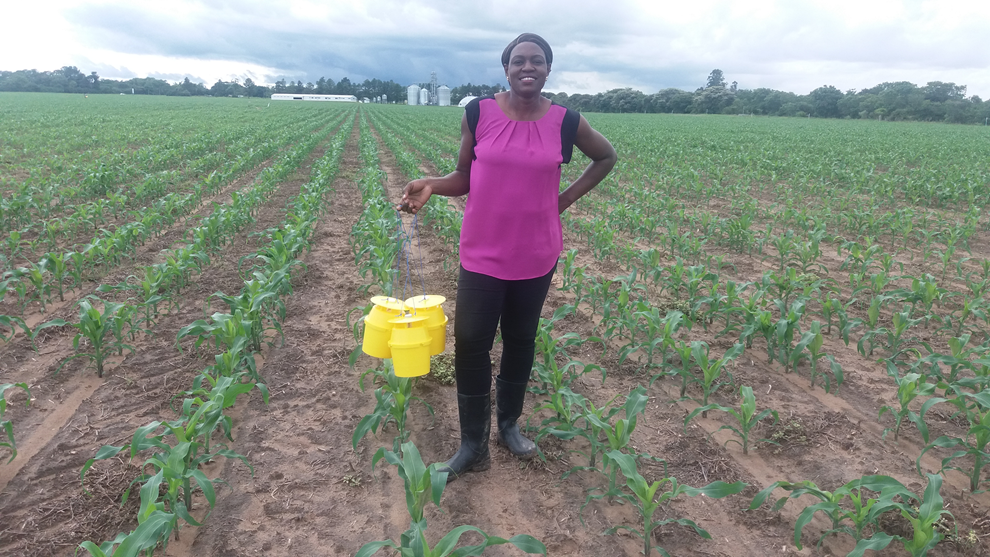
UK scholarship recipient leads charge against devastating maize pest in Zambia
As the performance of Zambia’s agricultural sector continues to be faced with the challenges of climate variability and fall armyworm pest invasion in the main crop maize, a UK agricultural scholarship graduate is making some considerable headway in tackling this pest through integrated control measures to guarantee food security.
Sheila Zulu, who studied for an MSc in Agricultural Sciences and Production Systems at Harper Adams University with a Marshal Papworth Fund scholarship, says: “It is critical to ensure that farmers understand the local resources at their disposal and obtain knowledge of what works best at minimal cost rather than continually depending on chemical interventions.” Sheila has used a combination of plant-based products that destroys the pest larvae and pheromone traps to trap the adult moths and minimise mating.

Sheila holding buckets used for trapping Fall armyworm adult moths at the AGCO Future farm in Zambia
Sheila highlights the scale of the problem in Zambia: “Since fall armyworms (FAW) were noted during the 2016/17 farming season, the devastating effect continues to hinder maize production, with crop damage across the country now over 300,000 hectares and yield loss of over 30 percent on this staple food. The pest has since continued to evolve and spread across the African continent.”
During Sheila’s year in the UK and as part of her studies, she was able to attend an Agriculture and Horticulture Development Board (AHDB) conference, equipping her with an understanding of the threats that surround farming policies in the UK, whilst working together to devise alternatives to ensure that farmers remain productive and investing resources in research to guide the industry. “Protecting crops from pest and diseases using various methods was among my take home messages from the AHDB conference,” says Sheila. “Sustainable crop protection using low risks methods such as biological controls was discussed and it blended in well with my MSc project, which was focused on determining the effect of using plant based products to replace conventional fungicides at T1 growth stage in wheat.”
“As an agronomist and trainer at the AGCO Future Farm in Zambia, my main role is to conduct agronomy training coupled with managing cropping trials which are based on demonstrating best farming practice. Through this I hope to particularly help the small-scale farmers who produce roughly 80% of Zambia’s food, and are most at risk of the devastating economic impact of crop failure,” explains Sheila.
Tom Arthey, chairman of the Marshal Papworth Fund, an agricultural development charity managed by the East of England Agricultural Society, said: “Sheila fully immersed herself in the Marshal Papworth Fund scholarship experience, combining her studies at Harper Adam University with learning everything she could from farm visits arranged by both the university and the Fund, as well as her time at the AHDB conference, to find a sustainable solution to such a devastating pest in Zambia.”
Tom continued: “Not only has Sheila demonstrated her academic capacity, but she was also a key mentor for our 2019 intake of short course scholars at Harper Adams University, fully living the ‘growing out of hunger’ ethos of sharing knowledge that is behind the Marshal Papworth Fund’s existence.”
To find out more about supporting the Marshal Papworth Fund, please contact Sandra Lauridsen on 01733 363514 or email slauridsen@eastofengland.org.uk for more information. If you’ve enjoyed learning about us and would simply like to make a donation please visit www.marshalpapworth.com/information/donate.html

